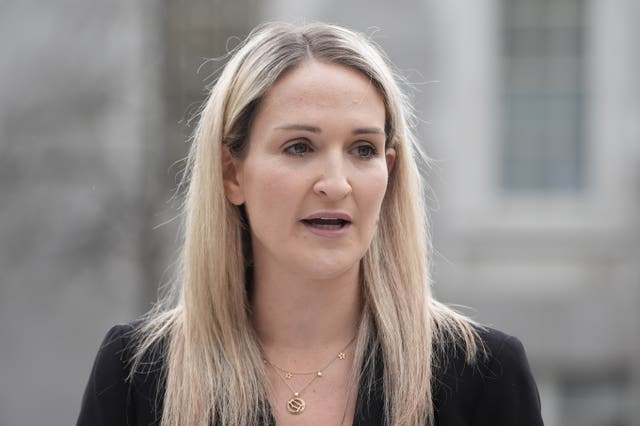
Taoiseach Simon Harris has appealed for Government coalition parties “not to rewrite history” with attacks on each other during the election campaign.
He was speaking after Fianna Fail justice spokesman Jim O’Callaghan said the Justice Ministry needs “new political control and direction” after 14 years with a Fine Gael minister.
Mr O’Callaghan said there was a “question mark” over whether Fine Gael was the party of law and order as he used the party’s election slogan to criticise its track record on justice.
The first week of the election campaign has seen the two largest coalition parties publicly rowing with each other, with Fianna Fail leader Micheal Martin saying he was surprised by the tone of the Fine Gael attacks.
On Friday morning, Fine Gael Justice Minister Helen McEntee hit back when asked about Mr O’Callaghan’s suggestion that she had adopted a series of proposals on law and order and immigration that he had put forward.
“I think there’s probably women all over the country who will understand what it’s like when men try to claim credit for their work,” she told reporters in Dublin on Friday.
Speaking at the nearby launch of Fianna Fail’s proposals to clamp down on crime, Mr O’Callaghan said that the Justice Department needed “a new energy” – which has been a Fine Gael campaign slogan.
“I think it would have been different and sometimes political emphasis or political direction have a real impact in terms of a government department,” he said.
“Look at housing, and look what Eoghan Murphy (former Fine Gael housing minister) said when he was in the department, you can have a well-intentioned minister, but unless you have the political emphasis and the political support behind you to make changes, it won’t happen.
“I believe, had we had the full ministry in the Department of Justice, I believe we would have seen greater progress in the area of justice.
“I think that’s part of the reason why Micheal (Martin) has indicated that if it comes to negotiations, if the people put us in the position where we can go into government, that’s one of the portfolios we’d be interested in pursuing.”

Asked whether Ms McEntee was an “ineffective” justice minister, Mr O’Callaghan said he was not going to personalise the criticism.
He said: “I’m not going to personalise it at all to Minister McEntee or to any Fine Gael minister, but let’s recognise the statistics.
“The Department of Justice has been under the control of Fine Gael for the past nearly 14 years, and although there’s been progress in very many other areas in the past four years, I think the questions that are arising in the Department of Justice over the past 14 years are growing in many respects.
“So I’m not going to personalise it to Minister McEntee, but I do think there is a benefit to help the Department of Justice under new political control and direction, as it really needs a new energy within that department.”
Speaking in Co Clare, Mr Harris said he did not want to get into a “tit-for-tat” with his coalition partners and insisted the government parties had worked well together.
The Taoiseach said: “We have worked well together for four-and-a-half years, we have delivered five budgets.
“We haven’t gotten everything right, we’ve gotten many things right, there are other areas we need to do better.
“We can’t have a situation now where people who were in the government, sitting around the cabinet table, who had effectively a veto on any decision, are now saying that department, that wasn’t under our control.
“That’s not how collective cabinet responsibility works.”
Mr Harris added: “There was a Fianna Fail taoiseach for two-and-a-half years of the lifetime of this Government.
“There was a Fianna Fail taoiseach or tanaiste for all of the lifetime of this Government and the reverse is also true in relation to Fine Gael.
“My experience of the four-and-a-half years in government, we shouldn’t rewrite history, was constructive engagement among three distinct parties.
“Helen was willing to serve as a minister. She turned up, put her shoulder to the wheel.
“Helen McEntee doesn’t need to be taking anyone’s ideas.”


Why are you making commenting on The National only available to subscribers?
We know there are thousands of National readers who want to debate, argue and go back and forth in the comments section of our stories. We’ve got the most informed readers in Scotland, asking each other the big questions about the future of our country.
Unfortunately, though, these important debates are being spoiled by a vocal minority of trolls who aren’t really interested in the issues, try to derail the conversations, register under fake names, and post vile abuse.
So that’s why we’ve decided to make the ability to comment only available to our paying subscribers. That way, all the trolls who post abuse on our website will have to pay if they want to join the debate – and risk a permanent ban from the account that they subscribe with.
The conversation will go back to what it should be about – people who care passionately about the issues, but disagree constructively on what we should do about them. Let’s get that debate started!
Callum Baird, Editor of The National
Comments: Our rules
We want our comments to be a lively and valuable part of our community - a place where readers can debate and engage with the most important local issues. The ability to comment on our stories is a privilege, not a right, however, and that privilege may be withdrawn if it is abused or misused.
Please report any comments that break our rules.
Read the rules here